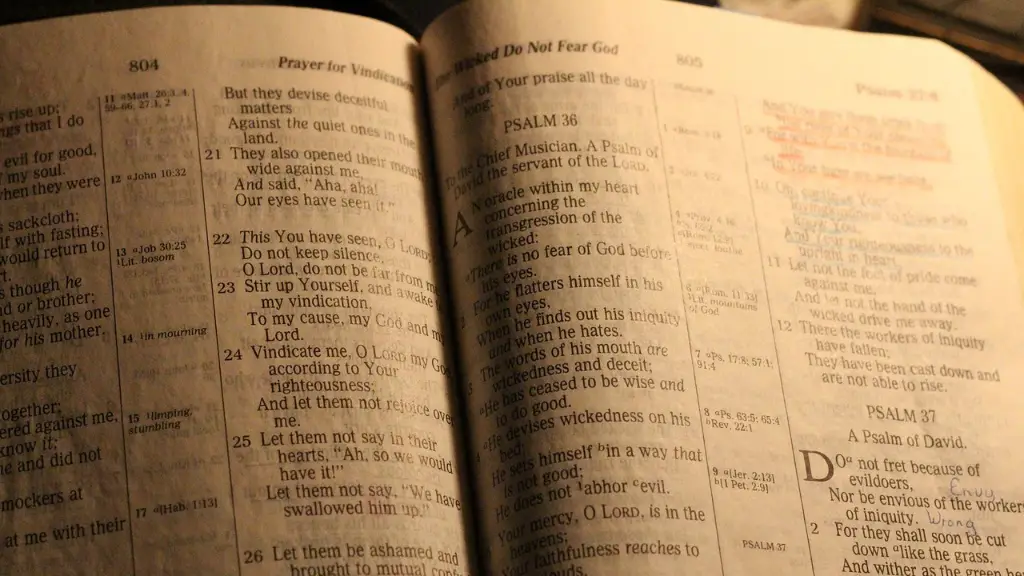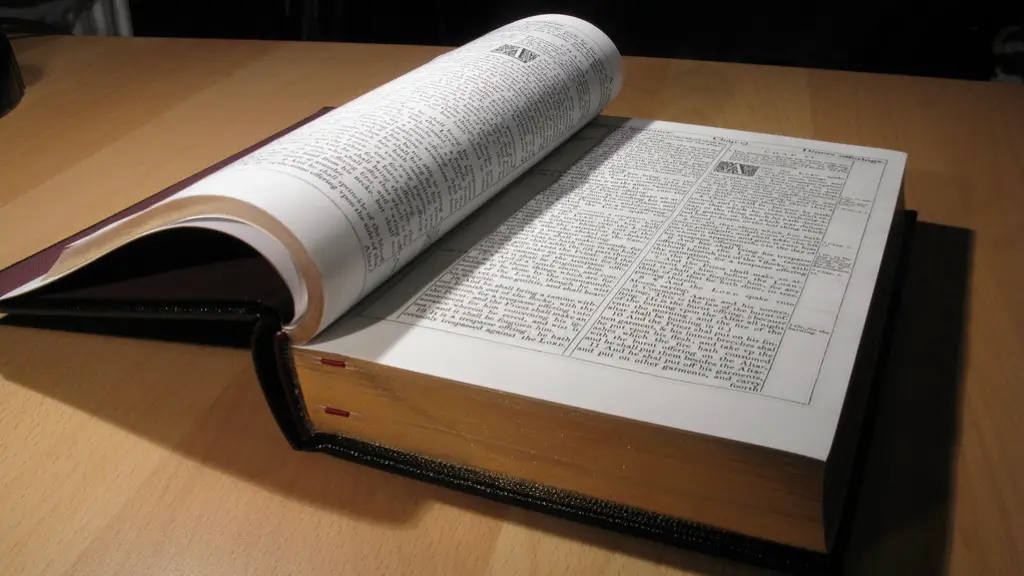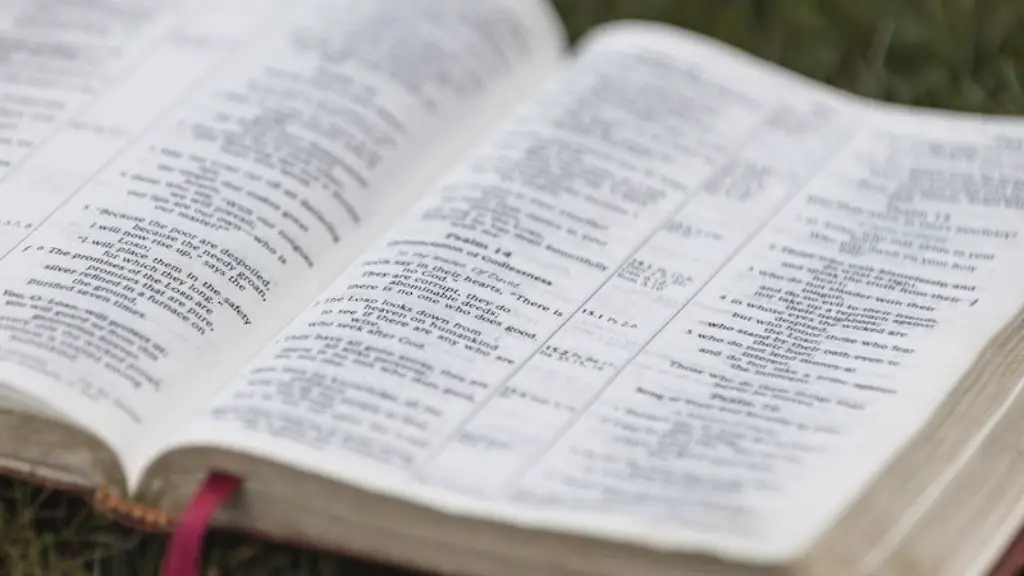What Does Lion Mean In The Bible
The Bible is filled with references to the lion. The animal is often used to symbolize strength and power, and there are numerous stories wherein lions play a crucial role. First and foremost, lions in the Bible often represent the power of God or of kings. In the New Testament, the symbolism is slightly different – the lion denotes resurrection, hope and harmony.
In the Old Testament, one of the most prominent lion references is from Daniel 6. Here, Daniel is thrown into a den of lions by a king who suspects Daniel to be an enemy. However, God intervenes to ensure Daniel’s safety and the lions not only do not harm him, but guard him and protect him in the den. This is meant to demonstrate God’s power, as Daniel is delivered despite being in the presence of fierce, wild lions.
The lion is also closely associated with the tribe of Judah, one of the Twelve Tribes of Israel. This is because the tribe’s flag contained the symbol of a lion, symbolizing a blend of strength and royalty.When Judah is mentioned in the Bible, it is usually in a positive light, usually accompanied by an image of a powerful, victorious lion.
Another example of a symbolic lion appears in the book of Revelation, where the visionary John sees a powerful lion-like creature with seven heads and seven crowns. It is a depiction of the Antichrist according to religious specialists, meant to represent the temptation and evil in the world. This also serves to emphasize the power of God, as His followers are able to resist temptation.
The lion references in the Bible can also have a personal meaning. It is sometimes used to refer to the fearlessness and power of faithful Christians, who must face great danger and temptation from the outside world without surrendering to it. It is also a reminder that, despite the odds, God will always be there to protect His people.
Finally, the lion is also a symbol of wisdom. Jesus himself was sometimes compared to a lion by referring to him as the King of Judah. Throughout the Bible, wise kings are often associated with lions, as they are metaphors for courage and strength.
Lion in Jewish Culture
The lion image is pervasive in Jewish culture. The Lion of Judah, which was a symbol of the Davidic line of kings, is used in Jewish religious texts and ceremonies. The Jewish people chose the lion as their emblem based on the account of the tribe of Judah, the fourth son of Jacob. As a result, the lion is seen as a symbol of strength, race and unity.
Rashi symbols, nineteenth-century symbols used to interpret biblical verses, depict the lion as a symbol of courage and gentleness. This connection may be derived from the Midrash, which explains that the lion cubs are extremely fragile during their first few years but become immensly powerful after that. This image of a vulnerable cub evolving into a powerful lion is seen as a metaphor for our spiritual journey.
The Menorah is also seen as the Lion of Judah, as each branch looks like a lion’s paw reaching for a gemstone. These gemstones represent the seven gifts of the Spirit. The Jewish people see this image as a symbol of running towards the light, as the stones are viewed as a metaphor for hope and divine guidance.
The lion is also seen as a symbol of justice, as the creature’s roar signifies authority and its presence signals protection of the helpless. This idea is evidenced in a Midrash in which a lion proclaims eight blessings, the last of which is justice. This is especially relevant in Judaism, where justice is a major concept.
The lion is also a symbol of purity, reflected in the Jewish commitment to preserving the values of purity, chastity, and self-restraint. When a lioness chooses a mate, she is usually very selective, and it is believed that the same principle should apply to relationships between partners.
Lion in Christianity
The lion is also central to many religious stories in Christianity. Like Judaism, the lion represents strength, courage, and power. However, it is also used to illustrate different traits such as humility, devotion, and faith.
In the Christian religion, the lion of Judah is seen as a symbol of God’s protection and power. As a symbol of God’s protection and power, the lion is believed to protect believers from all forms of evil. The lion of Judah appears in the Book of Revelation, as it is one of the major creatures used as symbols to represent the ultimate power of God.
The lion is also mentioned in various New Testament stories, such as the Parable of the Good Samaritan. In this parable, the Samaritan is accosted by the lion, but the Samaritan’s fearlessness and commitment to helping others wins out in the end. This parable is used to illustrate that devotion and selflessness are an important part of Christian life.
Another example of the lion in Christianity is in the story of Daniel in the lion’s den. In this story, God delivers Daniel from peril, as the lions in the den do not harm him. This story illustrates how God is a powerful, merciful protector who will always help His believers in times of need.
The lion is also a symbol of Jesus, who is often referred to as the “Lion of Judah” or the “Lion of the Tribe of Judah”. This title references the lion as a symbol of strength, royalty and wisdom, which are also associated with Jesus’ teachings.
Lion in Ancient Civilizations
Lions have been an important part of culture and religions for centuries, from the earliest civilizations such as the Egyptians, to the Greeks, to the Romans and up to today. The Egyptians believed the lion to be a symbol of power, strength and courage and associated it with the Pharaohs. In Greek mythology, lions are often seen as a symbol of power, courage and strength.
In the ancient world, lions were also seen as a symbol of war and battle. Warriors often adorned their weapons with lion imagery, and used the symbol on their shields and banners. Ancient kings and warriors also often wore lion skin cloaks, signifying command and strength. In Rome, lions were the symbol of power and strength. The Roman legions used the lion symbol to signify their status and power.
In many ancient cultures, the lion was also seen as a symbol of the sun and was associated with the god of sun in various religions. Female lions were seen as symbols of the moon, representing peace, tranquility and femininity. The lion was seen by many as a protector and guardian of the realm, and as such it was depicted in various royal insignias and royal crests.
Lion in Indian Culture
The lion also holds an important place in Indian culture. In Hinduism, the lion is seen to symbolize courage, power, nobility, and protection. It is a representation of Lord Narasimha and a manifestation of Lord Vishnu, the supreme god in Hinduism. It is also a symbol of Lord Shiva – the god of destruction and regeneration.
The lion is also the symbol of many Indian kings and leaders, who wore a lion-emblazoned crown to signify their strength and courage. Statues of lions are also found at the entrances of some Hindu temples, where they are seen as symbols of power and protection. In some areas, the lion is also seen as a rain bringer, and therefore is seen as a symbol of fertility.
The lion is also seen in some Indian folk tales, where it is represented as a brave, loyal and powerful creature. Various Indian gods are also depicted with a lion, such as Narasimha, the half-man half-lion incarnation of Vishnu. In some parts of India, the lion is also used to represent the king of the jungle, and the forest spirits.
Lion in Chinese Culture
The lion is one of the four celestial animals in Chinese culture and symbolizes courage, power and strength. It is a symbol of protection, authority, and justice. In Chinese folk tales, lions often feature as brave and powerful creatures who protect the people from harm. The lion is seen as a symbol of authority and is often featured in royal insignias.
In Chinese culture, the lion is also one of the twelve animals in the Chinese zodiac and represents strong character, courage and ambition. The lion is also used to represent Yang and is associated with the fire element in Chinese astrology. It is seen as a symbol of courage and strength of mind and will, as well as an example of integrity and loyalty.
The lion dance is also a popular traditional Chinese performing art that is associated with the lion. It is believed to bring good luck and fortune, and it often features at Chinese festivals and celebrations. The lion dance is also seen as a way to bring good luck and protection to people, and is believed to have the power to ward off evil spirits.





